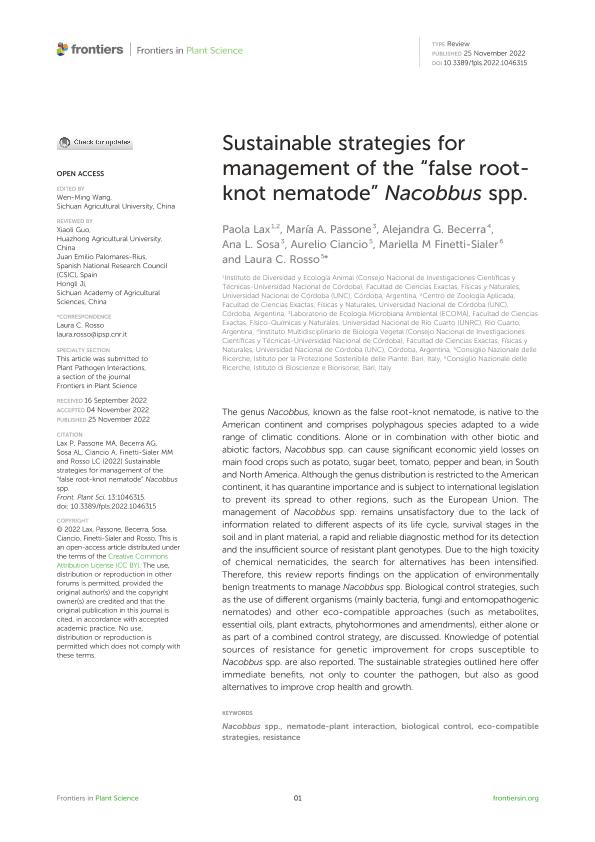Mostrar el registro sencillo del ítem
dc.contributor.author
Lax, Paola

dc.contributor.author
Passone, Maria Alejandra

dc.contributor.author
Becerra, Alejandra Gabriela

dc.contributor.author
Sosa, Ana Laura

dc.contributor.author
Ciancio, Aurelio
dc.contributor.author
Finetti Sialer, Mariella M.
dc.contributor.author
Rosso, Laura Cristina

dc.date.available
2023-06-28T15:33:21Z
dc.date.issued
2022-11
dc.identifier.citation
Lax, Paola; Passone, Maria Alejandra; Becerra, Alejandra Gabriela; Sosa, Ana Laura; Ciancio, Aurelio; et al.; Sustainable strategies for management of the “false root-knot nematode” Nacobbus spp.; Frontiers Media S.A.; Frontiers in Plant Science; 13; 11-2022; 1-20
dc.identifier.uri
http://hdl.handle.net/11336/201671
dc.description.abstract
The genus Nacobbus, known as the false root-knot nematode, is native to the American continent and comprises polyphagous species adapted to a wide range of climatic conditions. Alone or in combination with other biotic and abiotic factors, Nacobbus spp. can cause significant economic yield losses on main food crops such as potato, sugar beet, tomato, pepper and bean, in South and North America. Although the genus distribution is restricted to the American continent, it has quarantine importance and is subject to international legislation to prevent its spread to other regions, such as the European Union. The management of Nacobbus spp. remains unsatisfactory due to the lack of information related to different aspects of its life cycle, survival stages in the soil and in plant material, a rapid and reliable diagnostic method for its detection and the insufficient source of resistant plant genotypes. Due to the high toxicity of chemical nematicides, the search for alternatives has been intensified. Therefore, this review reports findings on the application of environmentally benign treatments to manage Nacobbus spp. Biological control strategies, such as the use of different organisms (mainly bacteria, fungi and entomopathogenic nematodes) and other eco-compatible approaches (such as metabolites, essential oils, plant extracts, phytohormones and amendments), either alone or as part of a combined control strategy, are discussed. Knowledge of potential sources of resistance for genetic improvement for crops susceptible to Nacobbus spp. are also reported. The sustainable strategies outlined here offer immediate benefits, not only to counter the pathogen, but also as good alternatives to improve crop health and growth.
dc.format
application/pdf
dc.language.iso
eng
dc.publisher
Frontiers Media S.A.
dc.rights
info:eu-repo/semantics/openAccess
dc.rights.uri
https://creativecommons.org/licenses/by-nc-sa/2.5/ar/
dc.subject
BIOLOGICAL CONTROL
dc.subject
ECO-COMPATIBLE STRATEGIES
dc.subject
NACOBBUSSPP
dc.subject
NEMATODE-PLANT INTERACTION
dc.subject
RESISTANCE
dc.subject.classification
Otras Ciencias Biológicas

dc.subject.classification
Ciencias Biológicas

dc.subject.classification
CIENCIAS NATURALES Y EXACTAS

dc.title
Sustainable strategies for management of the “false root-knot nematode” Nacobbus spp.
dc.type
info:eu-repo/semantics/article
dc.type
info:ar-repo/semantics/artículo
dc.type
info:eu-repo/semantics/publishedVersion
dc.date.updated
2023-06-15T18:00:32Z
dc.identifier.eissn
1664-462X
dc.journal.volume
13
dc.journal.pagination
1-20
dc.journal.pais
Países Bajos

dc.description.fil
Fil: Lax, Paola. Consejo Nacional de Investigaciones Científicas y Técnicas. Centro Científico Tecnológico Conicet - Córdoba. Instituto de Diversidad y Ecología Animal. Universidad Nacional de Córdoba. Facultad de Ciencias Exactas Físicas y Naturales. Instituto de Diversidad y Ecología Animal; Argentina
dc.description.fil
Fil: Passone, Maria Alejandra. Universidad Nacional de Río Cuarto. Facultad de Ciencias Exactas Fisicoquímicas y Naturales. Instituto de Investigación en Micología y Micotoxicología. - Consejo Nacional de Investigaciones Científicas y Técnicas. Centro Científico Tecnológico Conicet - Córdoba. Instituto de Investigación en Micología y Micotoxicología; Argentina
dc.description.fil
Fil: Becerra, Alejandra Gabriela. Consejo Nacional de Investigaciones Científicas y Técnicas. Centro Científico Tecnológico Conicet - Córdoba. Instituto Multidisciplinario de Biología Vegetal. Universidad Nacional de Córdoba. Facultad de Ciencias Exactas Físicas y Naturales. Instituto Multidisciplinario de Biología Vegetal; Argentina
dc.description.fil
Fil: Sosa, Ana Laura. Universidad Nacional de Río Cuarto. Facultad de Ciencias Exactas Fisicoquímicas y Naturales. Departamento de Microbiología e Inmunología. Cátedra de Ecología Microbiana; Argentina. Consejo Nacional de Investigaciones Científicas y Técnicas; Argentina
dc.description.fil
Fil: Ciancio, Aurelio. Istituto per la Protezione Sostenibile delle Piante; Italia
dc.description.fil
Fil: Finetti Sialer, Mariella M.. Istituto di Bioscienze e Biorisorse; Italia
dc.description.fil
Fil: Rosso, Laura Cristina. Istituto per la Protezione Sostenibile delle Piante; Italia
dc.journal.title
Frontiers in Plant Science
dc.relation.alternativeid
info:eu-repo/semantics/altIdentifier/url/https://www.frontiersin.org/articles/10.3389/fpls.2022.1046315/full
dc.relation.alternativeid
info:eu-repo/semantics/altIdentifier/doi/http://dx.doi.org/10.3389/fpls.2022.1046315
Archivos asociados
